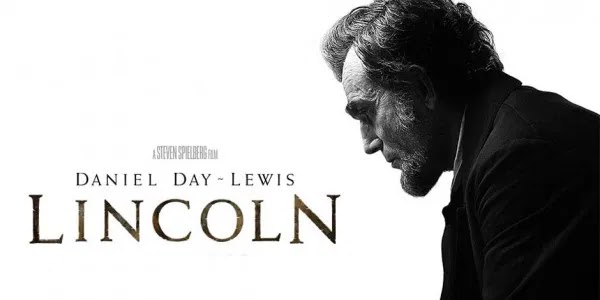Lincoln (Dir. Steven Spielberg, 2h 30m, 2012)
There are few figures in American history like Abraham Lincoln. Not only is he regularly considered America's greatest president, and his role in commanding the North to victory over the seceding South crucial in ending slavery, but he is practically shorthand for many of the best qualities of America. Thus, Lincoln enjoys, even compared to other presidents, a healthy afterlife in popular culture, from dozens of novels, to theme park animatronics, documentaries, videogames, television series and, of course, cinema. Indeed, films about Lincoln range from practically the birth of cinema to alternative history, including the bafflingly po-faced Abraham Lincoln: Vampire Hunter to well-crafted character portraits, of which Steven Spielberg's Lincoln, in which Daniel Day-Lewis produces a commanding portrait of the president, is one of the best.
Beginning in the aftermath of the Gettysburg Address Lincoln depicts the last four months of Lincoln's life, including the passing of the Thirteenth Amendment to outlaw slavery whilst dealing with the Democrats who vehemently stand against its abolition, and the warring factions inside the Republican Party, including inside his own Cabinet. Lincoln must also contend with winning the Civil War against the South, and his race against time to pass the Amendment before peace talks dissuade the Democrats and more Conservative Republicans. Among the business of politics, Lincoln nimbly also covers the relationship with his wife, still suffering from the loss of their son, Willie, and that with his surviving sons.
As with many of Spielberg's biopics, there is a masterful sense of his ability as a storyteller, whilst capturing the key points of the arguments for abolishing slavery and the complex web of political decisions Lincoln must pick his way through. Many of the scenes in Congress, and indeed in Lincoln's cabinet capture this perfectly, not only in the interplay between Lincoln and his cabinet, some of whom are vehemently against the idea of abolition, or fear it will irreparably damage the Republican Party. One particularly potent example comes late in the film, where Lincoln tears into his cabinet's fears, and lays out, in under a minute, the very reason not only for the war, of all the lives lost, and describes the amendment as a "cure" for the war, setting abolition as a moment not just for the moment, but to define America for centuries, before declaiming his power and the reason why the vote must succeed.
Around Lincoln are the rest of his cabinet, his generals, including Grant and indeed Congress, and it is in the Congress scenes that Spielberg's sense of drama, of the importance of the vote, of the community and the functionality of the House comes to the fore; it is where, as with previous films, and indeed subsequent, where Spielberg's ability as a storyteller best intersects with his interest and ability as a reteller of history. The players range in role from fervent abolitionist, Thaddeus Stevens, (Tommy Lee Jones), whose rhetorical abilities, under fire from both his own and the opposing party, are commanding, to Democrat Fernando Wood (Lee Pace) to the minor and provincial, all of whom eventually play their, in some cases, crucial roles, even if these run against the rest of their party.
This film is, undoubtedly, commanded by Day Lewis's performance-in places, it is practically uncanny, a towering recreation of the President, in appearance and tone, showing, by the end of the film, how badly the war and the battle to pass the Thirteenth Amendment have aged him. At points, Lincoln's power as an orator comes perfectly to the fore; that Spielberg deliberately has the Gettysburg address quoted back to Lincoln, rather than spoken by him himself is, whilst a daring move, one that only compounds his power as an orator. When Day-Lewis does proclaim, it is all the more powerful for it, his skill at holding the audience, be it laying out his reasoning for his decisions to his cabinet, or to huge crowds. He captures the magnetism of Lincoln the politician, of his power, and skill, in a performance that captures the sense of the legendary figure that now appears in stone and coin across the United States.
Yet, it is in his more personal interactions that Day Lewis captures the sense of Lincoln the man. There is a sense of vulnerability, of fragility that simply does not appear in other depictions of Lincoln-his relationship with his family is fraught, particularly with regard to Mary Lincoln, his wife (Sally Field). Left bereft by the death of her beloved son, Mary is at once self-lacerating, describing herself as a hindrance on her husband, and on his legacy, and at points, overly protective of the rest of her family, aghast when her husband eventually allows her eldest son, Robert, to join the Army. It is only occasionally that Lincoln shows his vulnerability, but with his sons, we see a tenderness, particularly with his younger son, Tadd, that otherwise is only seen through Lincoln's love of anachedotes, which often belie something more serious.
To make these last four months of Lincoln's life, full of political intrigue, power struggle and internal conflict interesting, is impressive. That Day Lewis manages to capture both sides of Lincoln, that Spielberg manages to balance the intricate political sphere with the deeply personal, manages to make Lincoln at once legend and human is nothing short of a triumph.
Rating: Highly Recommended



Comments
Post a Comment